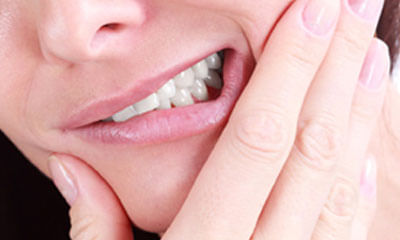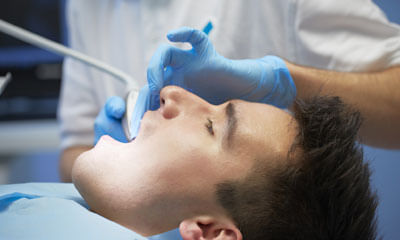Mouth Ulcers After Dental Work
I'm 30 years old male I got very big heat bubble in my mouth on the lower lip inside it hurting me a lot since 1 month I ...
Ask Free Question
Multivitamin cap, for five days in the morning after meals & antiseptic ointment or gel. Apply Mucapain gel on the area of ulcer until then. Mouth sores are common and rarely cause complications. Most go away in about a week, but itâs important to monitor any mouth sores you develop. If you are concerned, or if the sore doesnât seem to be healing, contact your dentist Rinse your mouth thoroughly with a mouth wash after every meals. Advance procedures can be done with laser.
Have bad breath doctor. Please help with a permanent remedy. Not confident to talk to someone in a closer distance. ...
Ask Free Question
Commonly because of poor oral hygiene causes bad breathing. Every six month visit dentist for Scaling treatment & a very course of medicine. Clean your mouth after food. Brush properly twice daily with proper tooth paste. Some time use mouth wash. If Caries or Ulcer is there in mouth then get the treatment. Drink sufficient water.
Hi, I keep getting one cranker sore after another. Once one heals up, I get another. Its really annoying now because I n ...
Ask Free Question
Most canker sores clear on their own in one to two weeks. Treatments, if required, include mouth rinses, pastes and medication.Possible triggers for canker sores include: A minor injury to your mouth from dental work, overzealous brushing, sports mishaps or an accidental cheek bite. ... An allergic response to certain bacteria in your mouth. Helicobacter pylori, the same bacteria that cause peptic ulcers.Stress on the tissues or any type of injury in the mouth can cause canker sores. Since the sores are actually tiny ulcers, they can be caused by any kind of hard brushing or eating something that can cause bruises or lead to tissue inflammation in the mouth.Baking soda is an alkaline and will neutralize acids that irritate the canker sore; it also helps kill bacteria to help your sore heal quickly. For a cure, try this home remedy: Rinse your mouth with a solution of 1 teaspoon baking soda in 1/2 cup of warm water Or Mix one teaspoon of salt in one cup of lukewarm water and stir it well. Use the solution to rinse your mouth. Swish the solution around for at least 30 seconds and then spit it out. ... After completing your rinse, put a pinch of salt directly on the canker sore. ...Repeat the process four or five times a day.
Hello I am 23 Year old male. I used to to chew gutkha but now I want to quit it. I used to chew 20 to 30 packets a day b ...
Ask Free Question
Gutka is a substance of abuse. It is a dry preparation, that consist of betel leaf, areca nut, tobacco, catechu (extract of the acacia catechu tree) & slaked lime, with sweet or savory flavorings. Due to its stimulant activity, gutka is used as a recreational drug. As it is a harmful product & do not have any beneficial effect on the body, you better quit it as early as possible. Now-a-days de-addiction treatments are available for quitting all substances of abuse including gutka. Such treatment includes detoxification & rehabilitation program. Consult a psychiatrist & start your treatment at the earliest. With treatment you can quit the gutka immediately & you will not require the gradual reduction of the quantity of gutka, as advised by your friend. Medical detoxification is the first stage of de addiction treatment, when the addicted person is treated with medicines. The withdrawal symptoms which occur on sudden stopping of an addictive substance are managed through detox treatment. Medical detoxification systematically and safely will withdraw you from the gutka. The next phase is the Rehabilitation program which includes counseling sessions & other behavioral therapies. These sessions have important role in the de addiction process. Counseling sessions will help to enhance your motivation skills to stay sober, build skills to resist gutka use, replace gutka-using activities with constructive and rewarding non gutka-using activities, and improve problem-solving abilities. Behavioral therapy will work on interpersonal relationships and your ability to function effectively in the family and community. Detoxification is usually completed within 7-10 days & can be done both on out patient basis & as in patient. Rehabilitation program usually ranges between 30-90 days. Along with, mentally prepare yourself to stay away from gutka. Following measures will help you to prepare yourself mentally against the substance: oEducate yourself adequately regarding gutka & its ill effects. Acquire the required information by reading books, going through internet or talking to a professional trained in de addiction. OKeep reminding yourself of the benefits you will achieve after quitting gutka: After quitting you will have reduced risk of the many diseases caused by gutka including oral cancer and a variety of other medical conditions like heart attack, respiratory, cardiac depression, hypertension, reproductive health dysfunction etc. Your teeth will be saved from the unpleasant stains. Your mouth will be saved from the bad odor caused by gutka. Any sores or ulcers in your mouth will heal well. You can focus more on your relationships. Taking gutka might have affected your relations if your close ones were against it, or because you were so preoccupied with the substance, your relations suffered. You can participate actively in social gatherings as you will not have to stay away to hide your habit nor have to come out frequently to chew gutka. You will save the money you were wasting on gutka & use them for better purposes. OImagine & create a picture of a beautiful future in your mind of a life without gutka. Imagine how much you will benefit in your new life. In between your beautiful imaginary picture also imagine that you started to take gutka again. Then imagine how one by one the beautiful picture will shatter. Once you become aware of the consequences of relapse, you will also develop fear of relapsing. You will then stay more cautious not to start it again. OCount the first day of your quitting as day of a new start & from that day, live one day at a time. It is helpful if you can relate this day to some important events in your life like your birthday or birthday of someone close, anniversary, day of some achievements etc. On the morning of the second day, tell yourself that you are starting the second day of your substance free life & by night time thank yourself that you stayed substance free whole day & encourage yourself to stay gutka free in coming days too. Celebrate your victory of staying sober on completing 1 week, 2 weeks, then 1 month, 2 months, 3 months, and on completing one year celebrate the first birthday of your sobriety. This will encourage you to stay sober further. OAvoid triggering factors that may tempt you to take gutka. For example if the triggering factor was internal say some stress for which you got inclined to abusing substance, then work on the stress to remove it or take help of a counselor to overcome the stress. If the triggering was external, like some friends persuaded initially & you could not say no, in some specific event or situation you started taking gutka etc, then stay away from those situation. OImmediately after quitting, craving will be intense. But gradually with time it will reduce. So the initial days you have to be very careful. Keep yourself busy & diverted. OThrow away all gutka you have with you. Having them within reach may increase your temptation. You can use alternatives like lozenges or chewing gum. OStart new healthy habits & opt for a healthy lifestyle. OEat healthy diet. OJoin a support group comprising of people who came out of addiction & had undergone the same situation as you. You will get a platform to discuss your queries & together can motivate each other to stay sober & also help others to overcome addiction. Start your effort to quit gutka at the earliest. All the best. Regarding the white marks on your mouth, get yourself examined by a doctor. He will advice you the necessary investigations & give treatment if required.
I got ulcer in my mouth around every month 2-3 times .even I am not able to take liquid or food at that time. What shoul ...
Ask Free Question
Aapke mouth me bar bar ulcer ho jate hai you must ,know the cause of ulcer in mouth main reason is Hurry Worry and curry deficiency of vitamins, especially B12 and C Poor dental hygiene,- Food allergies, Stress, Hormonal imbalance. You need to visit dental surgeon for scaling and polishing of teeth maintain good digestion and oral hygiene .apply boroglycerine and take precautions. Maintain good oral hygiene. Use a soft-bristled toothbrush. Use ice water of and on. Chew a few basil or tulsi leaves.- Apply little honey onto the mouth ulcer or mix in a little turmeric to make a paste that can be applied to the affected area. Honey helps to retain moisture and prevent dehydration. It also helps reduce scarring and hastens the process of new tissue growth. Reduce your stress levels by activity that you find relaxing, such as yoga, meditation or exercise.
My wife is loosing weight despite being normal & healthy. She is having balanced nutritional diet & hasn't suffered from ...
Ask Free Question
Hi lybrate user, her bmi is 23.8 which means her weight is normal for her height. If the weight loss is very rapid. That is 3-5 kgs per month. If properly measured. It can be due to several reasons. You can start with 1. Deworming tablets. If things still do not improve you can get her thyroid /sugar test / cbc done. But my hunch is that she is normal and in good health. For a good diet you can refer to the recommendations given by other doctors.
I am 39 year old . I am suffering from bad mouth odor for last One year . What can I do ? ...
Ask Free Question
•Eat a healthy, balanced diet and avoid eating strongly flavoured or spicy food. •Cut down on sugary food and drink, as it can increase the amount of bacteria in your mouth. •Reduce your alcohol consumption. •Stop smoking. •Cut down on coffee. •Drink plenty of water to help prevent your mouth becoming dry. •Chew sugar-free gum after eating, to stimulate the flow of saliva. This will help clean away any remaining food particles. •Don't use toothpaste to clean your dentures, as it can scratch the surface and cause stains. •Clean your dentures thoroughly using soap and lukewarm water, denture cream or a denture-cleaning tablet. •Use a separate toothbrush to clean your dentures. •Make sure you visit your dentist for regular check-ups. Having regular dental check-ups will ensure that any plaque is removed from your teeth, particularly in areas that are difficult to reach. •Your dentist can recommend the best way to clean your teeth and gums, and point out areas you might be missing. They can also identify any signs of gum disease and ensure early treatment. •Gastritis, lung & sinus infection may also be the cause of bad smell in the mouth. 90% of bad breath is due to a dirty tongue. •If your bad breath is caused by a gastrointestinal problem, such as an H. Pylori infection or gastro-oesophageal reflux disease (GORD), you may be referred to a gastroenterologist. •Persistent bad breath or a bad taste in the mouth may be a warning sign of gum (periodontal) disease. Gum disease is caused by the buildup of plaque on teeth. •You may need deep cleaning & fill tooth cavities with artificial enamel filling. Rinse your mouth thoroughly with a mouth wash until then. Advance procedures can be done with laser too. You may consult me in person.
What is the causes for bad breath? How can we prevent bad breath?(After brushing twice a day. Then also bad breath comin ...
Ask Free Question
Treating and preventing bad breath Treatment for bad breath (halitosis) will depend on its cause. Usually, the most effective treatment is improving your dental hygiene. As part of your daily routine, you should: floss between your teeth brush your teeth and gums clean your tongue You may want to consider investing in an electric toothbrush, which can make cleaning easier and more effective. Cleaning your teeth Your dentist will probably recommend that you brush your teeth at least twice a day using fluoride toothpaste. Below are some tips on how to brush your teeth and keep your mouth healthy. You should: use dental floss to clean between your teeth and remove trapped food that could cause tooth decay – brushing on its own only cleans about 60% of the tooth's surface choose a small or medium-sized toothbrush with soft, multi-tufted synthetic bristles replace your toothbrush every three to four months brush your teeth for at least two minutes – you could keep a toothbrush at work or school so you can brush your teeth after lunch brush all areas of your teeth, paying particular attention to where your teeth and gums meet – your dentist or oral hygienist may recommend using a special single-tufted brush for specific problem areas of your mouth use a separate toothbrush or a tongue scraper to lightly brush your tongue – some toothbrushes have a tongue cleaner on the back of the brush head avoid brushing your teeth for 30 minutes after drinking an acidic drink, such as fruit juice, or eating acidic fruit, such as oranges, to help prevent tooth abrasion Your dentist may recommend that you rinse your mouth daily using an antibacterial or anti-odour mouthwash. This shouldn't replace brushing, but can be included as part of your daily routine. Cleaning dentures If you wear dentures, you should take them out at night to give your mouth a chance to rest. Clean your dentures thoroughly before putting them in the next morning: don't use toothpaste to clean your dentures as it can scratch the surface and cause stains clean your dentures thoroughly using soap and lukewarm water, denture cream, or a denture-cleaning tablet use a separate toothbrush to clean your dentures Your dentures should stay clean and fresh if you follow this routine. It will also help prevent the build-up of plaque, which can cause bad breath. Fresh breath tips To help keep your breath fresh, you should: give up smoking eat a healthy, balanced diet and avoid eating strongly flavoured or spicy food cut down on sugary food and drink as it can increase the amount of bacteria in your mouth reduce your alcohol consumption cut down on coffee drink plenty of water to help prevent your mouth becoming dry chew sugar-free gum after eating to stimulate the flow of saliva – this will help clean away any remaining food particles You should visit your dentist for regular check-ups. Having regular dental check-ups will ensure any plaque and calculus – previously known as tartar – is removed from your teeth, particularly in areas that are difficult to reach. Your dentist can recommend the best way to clean your teeth and gums, and point out areas you might be missing. They can also identify any signs of gum disease and ensure early treatment. Gastrointestinal problems Bad breath can be caused by a gastrointestinal problem, such as an H. Pylori infection or gastro-oesophageal reflux disease (GORD). You may be referred to a gastroenterologist. The treatment recommended will depend on the type of gastrointestinal condition you have. For example, if you have a stomach ulcer, you may need a combination of two or three different antibiotics and a proton pump inhibitor (PPI). This is known as eradication therapy.
Sri. Am SRINIVAS completed B-TECH Age: 22 Am suffering with mouth sour, from 1 year It's curing &again repeating again a ...
Ask Free Question
Ulcers generally take 1-2 weeks to heal completely. Recurrent ulcers can be due to local mouth conditions such as rough teeth surface or rough mouth appliances or dentures n cheek bites. It can also b due to general nutrtional deficiency, digestion prob, work pressure n stressful lifestyle etc. Certain bacterial n viral infections also cause ulcers. Treatment: start on multivitamin tabs which includes vit c n iron supplements if your hb% levels r low. Apply dologel oral ointment on ulcers thrice daily. Avoid spicy n oily food, alcohol, tea n coffee. Drink plenty of water n hv fibrous n citrous foods. Visit dentist to rule out oral factors responsible for ulcers. Bad breath can b caused fue to various reasons. Due to smoking n using tobacco products, dental prob such as decay teeth, unclean tongue, gum infections, reduced saliva n dry mouth, ill fitting dentues, salivary gland probs. Other diseases n infections which also cause bad breath r sinus infections, respiratory tract infections such as bronchitis n pneumonia, liver n kidney probs, diabetes, acid reflux from stomach etc. Get scalling done by dentist. Use proper brushing techniques. Brush, floss n use mouthwash twice daily. Massage your gums with your finger tips after brushing. Keep your tongue clean. Rinse your mouth well after each meal. Get your decay teeth filled. Visit your dentist for dental checkups every 6 months to detect n prevent dental probs. Inspite of these measures if bad breath persists, consult a general physician for further evaluation.
Sir/mam. I have sensitivity in my left teeth. I can't drink water. Not even cold or hot drinks. Its been 4-5 days. Paren ...
Ask Free Question
Hello. Tooth sensitivity — also known as dentin hypersensitivity — affects the tooth or exposed root surfaces. This occurs when the enamel that protects our teeth gets thinner, or when gum recession occurs, exposing the underlying surface, the dentin, thus, reducing the protection the enamel and gums provide to the tooth and root. If hot, cold, sweet or very acidic foods and drinks, or breathing in cold air, makes your teeth or a tooth sensitive or painful then you may have sensitive teeth. Tooth sensitivity can come and go over time. Causes: There are many causes of tooth sensitivity, including: Worn tooth enamel from using a hard toothbrush or brushing too aggressively Tooth erosion due to highly acidic foods and beverages Tooth erosion due to bulimia or gastroesophageal reflux disease (GERD) Gum recession that leaves your root surface exposed There are several conditions which can cause pain, but which are not tooth sensitivity: Dental caries A cracked or chipped tooth Grinding or clenching the teeth Leakage around restorations External tooth bleaching Management: Proper oral hygiene is the key to preventing gums from receding and causing sensitive-tooth pain. If you brush your teeth incorrectly, or over-brush, your gums may become sensitive. Brushing properly twice daily for 2 minutes with toothpaste that does not have high levels of abrasives, and flossing once a day, can help reduce the chance of tooth sensitivity. A diet low in acidic foods (tomatoes, pickles, tea, citrus fruits) and drinks also helps prevent tooth sensitivity. Treatment: Apply Plantago Q/ few drops on cotton swab, place it on the affected teeth and press it tightly, do it thrice a day. Orally, take Mag. Phos. 6x/ after every 2 hours. Do visit a dentist for proper diagnosis, share the reports with me. In case possible, will help you in treating your problem.




